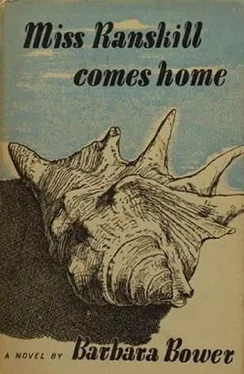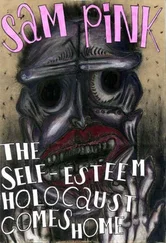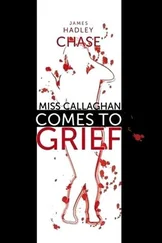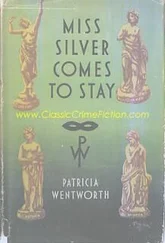‘Better light the stove, ’adn’t you, and a candle case the lights go?’
The striking of a match and the shielding of its wavering flame was better to Miss Ranskill than all the electric light switches in the world. She felt a sense of ritual as she lit the stove. Now she was compensating herself for all the fire-lighting struggles on the island. She set match to candle, too, before asking, ‘Why should the lights go out?’
‘Power Station might cop it,’ answered the boy. Then he added conversationally, ‘We brought down two Fokker-wolfs Thursday – that was the night our own flak killed Mr Coppinger.’
‘Oh!’ Once again Miss Ranskill was made aware of the new English language. She asked another question.
‘What was the noise – that awful whining noise before we came down here?’
The boy fidgeted and rubbed his chin against the Teddy Bear’s head. His face flushed as he answered, ‘I’ve not created for a long time now, but I’d bin dreaming.’
‘Created?’ repeated Miss Ranskill. Was the boy a ventriloquist? No, it was impossible that that eerie outpouring of misery could have proceeded from his small throat.
‘Kick up a row,’ he explained. ‘But ’Arold woke me up and I’d bin dreaming, and I didn’t know if Mum was in. I knew the doctor ’ad a went out some time since. I’d heard the night-bell.’
‘Who’s Harold?’ asked Miss Ranskill.
‘’Arold’s our siren – the one that sounded first. The second one we ’eard was Minnie from Larkford.’
‘Sirens?’ Miss Ranskill’s mind was snatching at a story – the story of a cruel-faced beauty luring sailors to the rocks. So might a siren have wailed across the water enticing the brave to the sound of distress.
‘Air-raid warnin’s – you know.’
‘Do you often have them here? ’ She emphasised the last word as disguise for her ignorance.
‘Not so much as we did, but they mean something now. Early on when we did ’ear the siren we didn’t get bombs. When we did get bombs we didn’t get the siren.’
He was about eight or nine years old, Miss Ranskill decided, terribly wise in his pathetic generation. His face was grey with sleeplessness, and his hair clung limply to his forehead. He shivered a little, and she changed the subject.
‘What have you got in that box round your neck?’
‘Go on! You know!’
‘I don’t.’
‘Go on with you!’
‘Show me then?’
Grubby fingers groped at a fastening and dragged out something with rubber straps. Then with a duck of the head and a jerk of the fingers the little boy was transformed into a pig-faced monster, a sort of synthetic goblin. His voice sounded muffled as he spoke.
‘Mrs Mallison always makes me bring it down in case of leaks from the gas. She don’t think ’Itler’ll use gas ’cept in the big towns. They mike us tike ’em to school though, just in case.’
Rows of pig-faced goblins paraded before Miss Ranskill’s mind’s eye – a ballet of child-goblins dancing to the tune that Hitler played and capering to the death-call of Harold and Minnie, the sirens. So this was England now, and she had looked forward to picking primroses.
The child pulled off the pig-face and began to stuff it into the cardboard container.
‘I’ve a tin ’at too,’ he told her. ‘Bought it at Woolworth’s last Christmas.’
‘Do you take that to school too?’
‘No, that’s only a bit of fun. It might keep a bit of shrapnel off of my ’ead though. D’you think there’ll be bombs tonight?’
His eyes darkened slightly.
‘I–’ said Miss Ranskill, helpless against the look that awarded her a false omnipotence. ‘I – surely not tonight.’ There was pleading in her voice too.
‘I don’t mind all that much. After there’s been bombs, Mrs Mallison gives us cups o’ cocoa and biscuits.’ He glanced at the row of tins on the shelf, and went on reminiscently.
‘Arter we was bombed out in Plymouth that time, they give us bully beef and cocoa made with Nestlé’s. You don’t get that now – not unless you’ve been bombed out.’
‘Don’t you?’
Miss Ranskill was remembering the iron tonics of her childhood and the rewarding chocolate ‘to take the taste away’. Was bully beef just compensation for the iron tonic of the bombs?
‘I liked Plymouth better’n this. When the blitzing started we used to go and sleep out in the fields all night, and walk back in the mornin’.’
‘Who did?’
‘Most of us along our street. I used to get a ride on top of a pram sometimes. It was all right in the summer. Then our street got an ’it. Our kitten and me Aunty got killed and Mum said she ’adn’t the ’eart to get any more furniture together, so we come ’ere. I missed the kitten.’
Having given his wordless picture of ‘Aunty’, the boy continued:
‘Worst time was when they got the school. We was all right though, me and about fifteen more, but some in my standard was killed.’
He broke off and his knuckles whitened as he clutched the Teddy Bear.
‘D’ you think there’ll be bombs tonight?’
Miss Ranskill looked at the ceiling for answer, but found none there and none in her mind either. She asked another question.
‘Did you always live in Plymouth?’
‘We was in London till the war.’
‘And was that lovely?’
She longed to turn his mind to something childlike, to the Lord Mayor’s Show or a school-treat in Epping Forest or a glance at the Crystal Palace from the top of a bus.
The boy scowled at the question.
‘Dad was out of work.’ There was a little pause, and he added, ‘Dad was killed at Dunkirk.’
He twiddled the Teddy Bear’s ears while Miss Ranskill considered these two chapters of a life-history. The phrases united into a poor little poem –
Dad was out of work;
Dad was killed at Dunkirk.
No, it was a rich poem and a great one, worthy of a place in any sequel to the Anglo-Saxon Chronicle.
She knew about Dunkirk because Commander Wrekin had instructed her in that most miraculous chapter in any history of war. Listening to him she had thought of two other sea occasions and the phrases that governed them – one: ‘He blew with His winds and they were scattered’; the other – ‘Peace, be still.’ She knew how the waters had been lulled in the Channel, so that small craft, hurrying from England, had run a silk-smooth course to the beaches where the men were crowded more thickly than any August mob in peace-time. In twenty-four hours the word ‘beach’ had changed in value: and lost its power to call up a holiday. The men who had come from that place would never be quite the same again.
‘Dad was killed at Dunkirk.’ He had died, presumably, that his son might inherit the land. The child, so far, had inherited Plymouth air-raids and his enemies had stolen his birthright of fearlessness. Miss Ranskill felt furious that anything so small could be counted as enemy.
The boy’s knuckles were rubbing his eyes now and he yawned.
‘Where were you before you come ’ere?’
‘I was on an island.’
‘Sheppey?’
His head was nodding before she could answer, his chin prodded the Teddy Bear’s head and the lids closed over eyes that had seen more than any child should have imagined and would, for always, be liable to darken because of the bad news-reel stored in his mind’s cinema.
He looked very frail, so easily crushable, and Miss Ranskill wished she knew more about the weight of bombs.
Suddenly, there came a sound as though a giant were slamming his door impatiently in a distant county. The sound was repeated.
The boy opened his eyes for a moment.
Читать дальше












